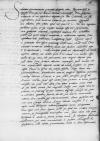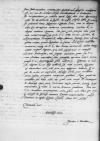Cum proximo autumno a me postulare dignata sit Tua Celsitudo, ut sibi perscriberem, quid novorum librorum ex nundinis Lipsensibus huc allatum esset, statui apud me, quod Tuae Celsitudini rem non ingratam facturus essem, si isti semper deinceps officiose significarem, cum quippiam eiusmodi praestantissimarum mercium huc advectum fuerit, aut quod alioqui comperero, in celeberrimo emporio Francofordiano orbi publicatum invulgatumque fuisse. Quare neque in praesentia huic officio qualicumque deesse volui, donec mihi Deus maiorem occasionem obtulerit animi mei studium addictissimum erga Tuam Celsitudinem declarandi. Principio quod ad desideratissimum ⌊Erasmum⌋ nostrum attinet, non dubito quin Tua Celsitudo simul cum multis aliis doctis et piis viris sibi persuaserit, eum insigne aliquod opus post obitum suum primum edendum reservasse, quod invidia una cum corpore suo sopita aequioribus animis ab omnibus exceptum iri speravisset. Verum ea opinio nos prorsus fefellit. Nam heres eius fidei commissarius, ⌊Amorbachius⌋ nomine, praefixit epistolam quandam catalogo librorum ⌊Erasmi⌋, in qua palam pernegat, quicquam ab Erasmo relictum, quod post mortem suam primum in lucem prodire voluisset, nisi quod inter libros suos opera quaedam antea modo ab ipso edita inventa sint recognita. Nam eam fuisse hominis pietatem, ut quaecumque de fide catholica deque aliis gravissimis rebus, quae in ecclesia agitantur, senserit, abunde suis aeternis monumentis interim, dum vixisset, piis communicaverit. Hanc epistolam una cum novo catalogo librorum ⌊Erasmi⌋ libenter misissem Tuae Celsitudini, sed nostri rudes bibliopolae nullum eius exemplar secum advexerunt. Unius copia mihi solum legendi facta est, quod huc cuidam amicorum meorum ex ⌊Francofordia⌋ transmissum erat. Inter libros autem, quos bibliopolae hi attulerunt, paucos eximios inveni. In theologia ⌊Chuonradum Pellicanum⌋, qui modo commentarios in quattuor Evangelia et Apostolorum acta edidit, quemadmodum antea in Vetus Testamentum.
Item Itali cuiusdam carmen, quo quattuor Evangelia complexus est, nec non et ⌊Eobani Hessi⌋ lucubrationes in Psalterium. In iurisprudentia ex relictis operibus Zasii editi sunt commentarii super titulo "De actionibus in Institutionibus" et super aliquot libris (digesti) veteris. In politioribus litteris Rhetorica ⌊Lodovici Vivis⌋, item in aliquot orationes ⌊Ciceronis⌋ diversorum auctorum enarrationes, similiter et in aliquot orationes Livianas. Hi fere sunt praecipui libri, quos mihi videre contigit, ex quibus Tuae Celsitudini mitto carmen ⌊Eobani⌋ et Excusationem principum et aliorum statuum imperii, quos evangelicos vocant, quare synodum a ⌊summo pontifice⌋ indictam recusarint, rogoque ut Tua Celsitudo haec tenuia munuscula eadem benignitate recipere dignetur, qua mihi significavit se recepisse ⌊Erasmi⌋ Ecclesiasten, tum propter amicitiam, quam scio Tuae Celsitudini cum ⌊Eobano⌋ intercedere, tum propter animum meum nuncupatissimum Tuae Celsitudini perpetuaque fide istam culturum. Ceterum si Tua Celsitudo sibi aliquem et ex aliis auctoribus {sibi} mitti voluerit, dignetur id demandare mihi, nihil prius aut antiquius habituro, quam ut isti et in hac re conficienda et in aliis omnibus, quae facultatis erunt nostrae, promptum obsequium exhibeam. Novi quod his annectam fere habeo nihil, nisi quod certo accepi divorum ⌊Hieronymi⌋ et ⌊Ambrosii⌋ opera prelo Frobeniano rursus excudi, brevique longe emendatiora quam antea in manus hominum proditura. His me Tuae Celsitudini humiliter commendatum velim, istam vero Deo optimo maximo quam diutissime et felicissime communi patriae conservandam.


